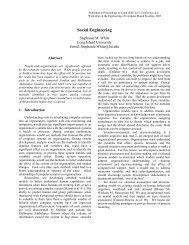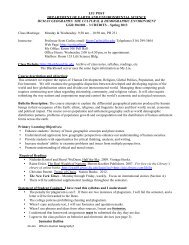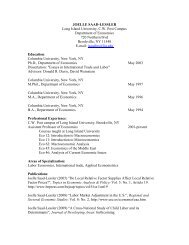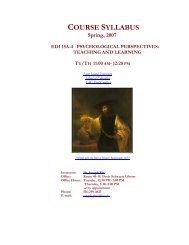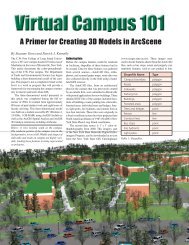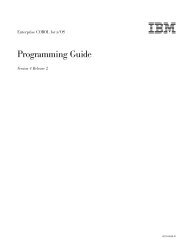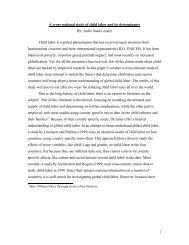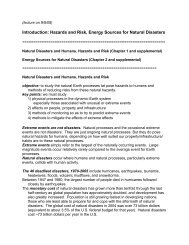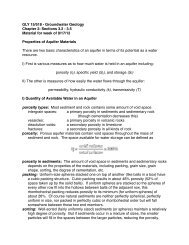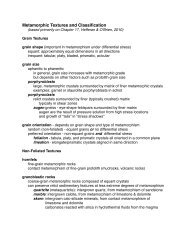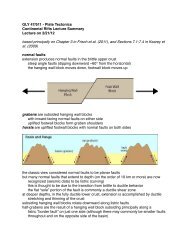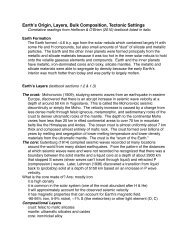COURSE SYLLABUS - Myweb @ CW Post - Long Island University
COURSE SYLLABUS - Myweb @ CW Post - Long Island University
COURSE SYLLABUS - Myweb @ CW Post - Long Island University
Create successful ePaper yourself
Turn your PDF publications into a flip-book with our unique Google optimized e-Paper software.
EDD1004 Fall, 2013 1<br />
<strong>COURSE</strong> <strong>SYLLABUS</strong><br />
Fall, 2013<br />
EDD 1004 School and Community: Policy and Practices<br />
(3 DOCTORAL CREDITS)<br />
Joseph Piro, PhD<br />
Associate Professor<br />
<strong>Long</strong> <strong>Island</strong> <strong>University</strong><br />
Office: Room 40- B. Davis Schwartz Library<br />
Office Hours: Mondays- 3:00pm- 5:00pm<br />
Phone: 516-299-3823<br />
E mail: joseph.piro@liu.edu<br />
Web Page: http://myweb.cwpost.liu.edu/jpiro/<br />
Twitter: @profpiro<br />
Skype: ProfPiro<br />
Course Weekday and Hours: Mondays, 7:00- 8:50 pm<br />
Course Description<br />
This course draws on the knowledge and understanding of policy analysis and effective<br />
change strategies, focusing on the diverse social and cultural aspects of a community and how<br />
these aspects influence teaching and student learning goals. Students will develop strategies<br />
for learning about and communicating with the community, a community that operates within<br />
local, state, national, and international contexts. The course will acquaint students with the<br />
political forces that propel and shape public education at multiple levels, and with the social<br />
issues that impact the operation of schools and school districts. Students will gain an<br />
understanding of community relations, writ large, and will be able to employ collaborative<br />
strategies and processes of communication in order to explore emerging issues and trends that<br />
potentially influence their school and community.<br />
LEARNING OUTCOMES<br />
Learning outcomes are what you are able to do as a result of the activities, e.g.,<br />
readings, instruction, that will occur during this course. These also connect to the overall<br />
expectations the EdD program has for you. Assignments and activities related to these<br />
outcomes are described in this syllabus. In general, student learning outcomes for this course<br />
will be demonstrated through individual and group projects, class discussions, research papers,<br />
online postings, and course professionalism. The student learning outcomes for this course are<br />
the following:<br />
The student will:<br />
Demonstrate an understanding of the politics of education enterprise through class<br />
discussions, online posting, and research papers<br />
Demonstrate an understanding of state, federal, and international perspectives that<br />
affect P- 20 education through website development, class discussions, online postings,<br />
and research papers
EDD1004 Fall, 2013 2<br />
<br />
<br />
<br />
<br />
<br />
<br />
<br />
Demonstrate an understanding of political issues and forces that directly or indirectly<br />
impact education and how to communicate this knowledge effectively through website<br />
development, class discussions, online postings, and research papers<br />
Demonstrate an understanding of how culturally and economically diverse groups affect<br />
the course of education in school communities and society through website<br />
development, class discussions, online postings, and research papers<br />
Demonstrate an understanding of strategies for working with such groups as the<br />
business community, community agencies, and parent groups through website<br />
development, class discussions, online postings, and research papers<br />
Demonstrate an understanding and analysis of controversial issues and policies in<br />
education and discuss their significance through website development, class<br />
discussions, online postings, and research papers<br />
Demonstrate an understanding of the structure of policy writing through website<br />
development, class discussions, online postings, and research papers<br />
Demonstrate an understanding of the skills of policy writing, policy review, and policy<br />
analysis through website development, class discussions, online postings, and research<br />
papers<br />
Demonstrate an understanding of the interdisciplinary nature of psychology, sociology,<br />
technology, and policy<br />
SUGGESTED <strong>COURSE</strong> TEXTS<br />
THESE TEXTS ARE SUGGESTED TEXTS FOR THE <strong>COURSE</strong>. THEY ARE NOT REQUIRED TO BE PURCHASED.<br />
YOU MAY OBTAIN THEM FROM ANY SOURCE (WEB SITE, BOOKSTORE ETC.) YOU WISH. I DO SUGGEST<br />
PURCHASING THE APA STYLE MANUAL SINCE THIS WILL BE UTILIZED THROUGHOUT YOUR DOCTORAL<br />
STUDIES.<br />
1. Fowler, F.C. (2013). Policy studies for educational leaders (4 th ed.) Boston: Pearson.<br />
http://www.pearsonhighered.com/educator/product/Policy-Studies-for-Educational-Leaders-<br />
An-Introduction-4E/9780132678117.page<br />
Note: Amazon (www.amazon.com) has a Kindle version as well as one which may be rented.<br />
http://tinyurl.com/d32yrx3<br />
2. American Psychological Association. (2009). Publication manual of the American<br />
Psychological Association (6 th ed). Washington, D.C.: Author<br />
http://www.apastyle.org/manual/index.aspx<br />
There are also tutorials available on the APA web site to help familiarize you with the Style<br />
Manual.<br />
http://www.apastyle.org/learn/tutorials/basics-tutorial.aspx<br />
Make sure you purchase the third printing or above of the APA manual in soft cover,<br />
hardcover, or spiral bound format.
EDD1004 Fall, 2013 3<br />
3. Internet websites throughout the course containing hypertexts of various readings in<br />
educational psychology. Online articles, distributed learning tools, and supplementary readings<br />
provided by instructor. These reading assignments will be periodically updated on the course<br />
website.<br />
Supplementary Reading<br />
4. Cooper, B., Cibulka, J.G., & Fusarelli, L. (Eds.) (2008). Handbook of education politics and<br />
policy. New York: Routledge.<br />
http://www.routledge.com/books/details/9780805861129/<br />
Amazon: http://www.amazon.com/Handbook-Education-Politics-Policy-Cooper/dp/0805861122<br />
SUPPLEMENTAL RESOURCES<br />
One effective way for professionals in the field to keep up is by reading Education Week<br />
at http://www.edweek.org/ I would also like students to consider getting an online<br />
subscription to Education Week. You can find additional information at:<br />
http://www.edweek.org/offer_stud_prof.html?cmp=profess10<br />
I would also like you to sign-up to daily Smart Briefs from ASCD. These briefs<br />
summarize some major news stories on education. There is no charge for this. It’s<br />
automatically sent to an e-mail address you specify. For further information go to:<br />
http://www.smartbrief.com/ascd/<br />
<strong>COURSE</strong> APPROACH<br />
This course mirrors a 21 st Century, interdisciplinary approach to learning by varying<br />
learning conditions throughout the semester and, most importantly, makes extensive use of<br />
Blackboard for online course delivery. Because of this, sessions will be conducted in the<br />
Computer Lab (LIB 230). There will be the conventional lecture format, hands-on experiences,<br />
videos, podcasts, webinars, and class discussions. To enhance the overall learning experience,<br />
there will be student presentations as well as (tentative) guest speakers. Some lectures will be<br />
augmented by PowerPoint, Prezi, Sliderocket, and other mixed-media presentations.<br />
All students should come to each class with all reading assignments completed for that<br />
week. Preparing these readings with your own questions and insights is an important<br />
component to the overall success of the course. It is also expected that students will bring<br />
their own experiences (both professional and life) into classroom discussions, presentations,<br />
and projects. Generally, one focus issue will comprise the agenda for each class and students<br />
will be responsible for introducing the issue and leading discussion on it. Since events in<br />
education also occur spontaneously, you should also be prepared to discuss issues that may<br />
arise during the course of the semester.<br />
The course will be make extensive use of the Internet with a good portion of hypertext<br />
reading assignments able to be accessed online. In addition, students are expected to infuse<br />
as much technology-informed strategies as possible in both learning the course material and<br />
developing the assignments that are part of the course. For each week’s assignments, you will<br />
see a variety of readings and websites, some required, some recommended. The fact that
EDD1004 Fall, 2013 4<br />
many of the readings in the course are web-based should add to their ease of access and<br />
availability.<br />
We will also make use of webinars during the semester using the conferencing software<br />
www.gotomeeting.com.We will schedule some class sessions using this conferencing software.<br />
Additional details will be presented in class.<br />
Throughout the course, I welcome your input on the effectiveness and usefulness of<br />
this approach.<br />
E-Mail<br />
The preferred method of communication to me is through e-mail. In order to keep e-<br />
mail correspondence organized, please use the following e-mail address: piro@eddprogram.net<br />
If you e-mail me through this address or use the joseph.piro@liu.edu address, please<br />
make certain your name is in the subject line of the mail so that it may be identified as sent<br />
from a student in the class.<br />
I will also ask you to provide a working e-mail account as well through which we will<br />
communicate during the semester. This e-mail account must be one that you check frequently<br />
(including weekends and holidays), if not daily. If your e-mail address changes during the<br />
course, please send me an e-mail from the new account immediately, so that I can change<br />
your address in my records and can stay in touch with you via e-mail during the course. Please<br />
understand that you will not be excused from responsibility for course requirements or other<br />
course changes/announcements due to a failure to check your e-mail regularly or to inform me<br />
of changes in your email address<br />
Technology Policy<br />
As present (and future) leaders in education, it is important that you develop a working<br />
familiarity with multiple aspects of technology in order to meet the increasing challenges of<br />
education in the 21st century. To this end, we will utilize technology in a multiple ways in order<br />
to increase personal and professional productivity and expertise. First, we will follow a BYOD<br />
policy, that is “Bring Your Own Device,” to weekly sessions. This can be a tablet, netbook, or<br />
iPad. Even though we are meeting in a computer lab where you will have access to a desktop,<br />
these portable devices will be useful. We will also be using Blackboard as a course<br />
management site. You will be required infuse technology into your presentations and projects.<br />
We will also be conducting occasional webinars where we will meet online and not in campus<br />
using http://www.gotomeeting.com. For these virtual meetings, it is suggested that you have<br />
a headphone available as well as (high speed) Internet access. You might also perform a<br />
“browser test’ to ensure that your present browser is the most recent version.<br />
From past experience, I am fairly certain that there will be a range of technology<br />
proficiency within the class so you should not feel uncomfortable if your skills are at the<br />
developing stage. These skills will be greatly improved throughout the course and by the close<br />
of the semester, you should see a noticeable “bump” in your level of technological skills as well<br />
as your confidence in using technology and knowledge of technological resources that can be<br />
integrated into teaching and learning.<br />
Some Suggested Apps: Common Core, Idea Flight, Newspapers, Notes, Keynote,<br />
Popplet, Evernote
EDD1004 Fall, 2013 5<br />
Twitter<br />
Social media is changing how students learn at all levels of education. When employed<br />
properly, these media can enhance communication of ideas and depth of learning. Because of<br />
this, I would like all students to follow my microblog Twitter feed which is @profpiro. We will<br />
discuss details about this during the first week of class. This Twitter feed will update you on<br />
articles, websites, data etc. on topics related to your doctoral studies as well as education at<br />
large. Providing access to this type of information will serve to keep you informed about<br />
related developments concerning topics we are exploring in class.<br />
Twitter: http://twitter.com/<br />
How to sign up for Twitter: http://tinyurl.com/29sr875<br />
Blogs<br />
You might also want to consult or subscribe to the following educational policy blogs:<br />
http://larryferlazzo.edublogs.org/<br />
http://www.shankerblog.org/<br />
Education Week also offers a number of blogs as well. Here are some of their suggestions for<br />
blogs related to independent schools:<br />
http://blogs.edweek.org/edweek/independent_schools/2013/06/independent_school_vo<br />
ices_a_blog_sampler_part_iv.html<br />
You can subscribe to these blogs individually or through an RSS feed.<br />
Library Resources<br />
Online library resources for the course are available through http://tinyurl.com/edlibrary<br />
<strong>COURSE</strong> WEBSITE<br />
This course will make use of a website uploaded to LIU’s Blackboard address that will<br />
contain a variety of information related to the course. It is important that you check the<br />
website at least once a day to keep up with any news, announcements, messages etc. related<br />
to the course. You should also check your Blackboard e-mail from the course for any other<br />
updates I will provide.<br />
EdD Interdisciplinary Studies:<br />
http://www.liu.edu/<strong>CW</strong><strong>Post</strong>/Academics/Schools/CEIS/Dept/Doctoral.aspx<br />
<strong>COURSE</strong> REQUIREMENTS<br />
Student involvement in the course will take the following five forms:<br />
Fast Facts Paper<br />
Policy Brief & Curated Board<br />
Student Website<br />
Course Professionalism
EDD1004 Fall, 2013 6<br />
<strong>COURSE</strong> GRADING POLICY<br />
Course grades will be an accumulation of points over the semester calculated as follows:<br />
ASSIGNMENT PERCENT DUE DATE(S)<br />
1. Fast Facts Policy Brief 10% November 12 th<br />
2. Paper (30%) and Curated Board<br />
40% December 16 th<br />
(10%)<br />
3. Student Website 40% December 9 th<br />
4. Course Professionalism 10% Ongoing throughout the course<br />
Grade Scale Used in Course*<br />
95-100 A 77-79 C+<br />
90-94 A- 73-76 C<br />
87-89 B+ 70-72 C-<br />
83-86 B 65-69 D<br />
80-82 B- Below 65 F<br />
<strong>COURSE</strong> ASSIGNMENTS<br />
<br />
Fast Facts Policy Brief<br />
This assignment is connected to the policy paper you will be composing for the course.<br />
This policy paper take a position on a policy issue and discuss its meaning, importance, and<br />
implication for your community and, when relevant, the education field, in general. As<br />
doctoral students, as well as present and future leaders in the field, you should begin to<br />
develop various analytical perspectives on issues in education. This assignment will help you<br />
focus on this and clarify your thinking on issues and ideas that will probably concern you in<br />
your education practice, present and future.<br />
For this assignment you will be asked to create a one page “Fast Facts” paper that<br />
offers a position on policy issue that is written for “general consumption,” that is a nonspecialized<br />
audience. As policy writers, one of the skills that you will find important is to<br />
communicate policy issues in as a direct and coherent manner as possible. This assignment<br />
will afford practice for this skill set.
EDD1004 Fall, 2013 7<br />
Some suggestions for policy issues will be provided to you. During the early part of the<br />
semester, we will discuss these issues, as well as others you suggest, to help you make your<br />
choice of issue one that interest you and relates to your present professional interests.<br />
Examples of “Fast Facts” will also be provided as well as a template for its completion.<br />
More information on this assignment will be available on the website.<br />
Policy Paper, Presentation, & Curated Board<br />
The final project will focus on the production of a “Multiple Perspectives Position Paper”<br />
directly related to the issue you have selected to examine throughout the semester, and which<br />
you have experienced in your community setting. You will see that these span the spectrum<br />
from school finance to technology in education, to globalism and its impact on the local<br />
community. You can also feel free to suggest your own issue, one that impacts upon policy and<br />
practice in your own professional community. This project is the end point along the<br />
investigative continuum that begins with class discussion, proceeds to the Fast Facts, and then<br />
culminates with the Policy Analysis. It might be advisable (and interesting) to tie some aspects<br />
of your issue to the Race to the Top (RttT) initiative that has been created by the Department<br />
of Education under the Obama administration.<br />
The U.S. Department of Education (http://www.ed.gov/programs/racetothetop/index.html)<br />
decided that to qualify for RttT funding there are four areas of reform (i.e., “The Four<br />
Assurances”) that must be addressed:<br />
<br />
<br />
<br />
<br />
Adopting standards and assessments that prepare students to succeed in college<br />
and the workplace and to compete in the global economy;<br />
Building data systems that measure student growth and success, and inform<br />
teachers and principals about how they can improve instruction;<br />
Recruiting, developing, rewarding, and retaining effective teachers and<br />
principals, especially where they are needed most; and<br />
Turning around our lowest-achieving schools.<br />
In the paper you will define your policy, take a position on it, and examine a range of<br />
potential alternatives, improvements, and expansions. In this process, you should consider the<br />
potential financial costs as well as the economic, political and social feasibility of your proposal,<br />
and any ethical issues that may arise. Policy analyses are generally written with a particular<br />
audience in mind and, in this case, it should be your local community and, if possible,<br />
“community” writ large. Here is where you might expand out to “action” sources for your policy<br />
investigation. In addition to books, periodicals, and web sites, you may wish to speak to<br />
“primary players” who are involved in the policy issue you’re examining. See what their<br />
perspectives are and try to incorporate these into your analysis.<br />
The length of the Policy Paper should be 15-20 pages (including title page, abstract,<br />
text, figures and tables, and bibliography). It will be assessed both on its content as well as its<br />
final presentation. Your policy paper should, at minimum: (1) present an overview of the<br />
policy setting and intended audience and its present state and include a statistical context; (2)<br />
describe how is it supported by data and the critical literature; (3) identify the participants<br />
(stakeholders, policy “actors,” and their actions; (4) present your policy points, suggestions<br />
etc.; (5) explain the risks and benefits of the policy as well as the costs; (6) list some of your<br />
own specific policy recommendations for improvement, expansion etc.; (8) discuss its potential<br />
impact and advise how it will be assessed. Additional information will be available on the<br />
course web site.
EDD1004 Fall, 2013 8<br />
Content Curation<br />
To accompany your policy paper, you will also create a digital product in the form of a contentcurated<br />
board to which are attached articles of interest from various digital sources related to<br />
your topic you have encountered during the semester for all “constituents” to use. For this you<br />
will turn to the social networking websites www.pinterest.com or http://www.scoop.it. Here is<br />
an example of a socially curated board by ASCD on common core:<br />
http://pinterest.com/officialascd/common-core-state-standards/<br />
and one that I have begun to curate on iPads in education:<br />
http://www.scoop.it/t/ipads-in-education-by-joseph-piro<br />
Ed Tech Sample Boards: http://pinterest.com/shellyterrell/<br />
http://pinterest.com/erinklein/edutech-resources/<br />
http://pinterest.com/marylirette/all-things-technology/<br />
http://pinterest.com/kbrynteson/ed-tech/<br />
Pinterest tutorial: http://modernlessons.com/course/the-beginners-guide-to-pinterest/<br />
List of content curation sites- feel free to experiment with any of these:<br />
http://www.teachthought.com/learning/55-content-curation-tools-to-discover-andshare-digital-content/<br />
We will discuss specifics related to this during the semester. We will also allocate class time for<br />
each student to present his/her policy paper and curated Board during the final two class<br />
sessions. You may select any modality to present your work. These can take the form of a<br />
PowerPoint, Prezi, Slide rocket, website, podcast, video, iMovie, documentary, etc.<br />
<br />
Student Website<br />
Because of the continuing emphasis on the role of technology in education, one of the<br />
major instruments of communication that helps to “brand” you within your professional<br />
community is a website. This website can be valuable in getting across to “constituencies” and<br />
other policy “actors,” some of your thinking about education policy. To this end, you will be<br />
required to begin constructing a website which archives the products you create for this class,<br />
as well as other relevant information sources you think important for your policy “network” to<br />
know. This can include anything from papers you have written to your recommendations for<br />
timely education books and articles. We will accomplish this by using various platforms<br />
including Google sites, Weebly, Homestead or any other platform with which you are familiar<br />
and comfortable. We will discuss this at the beginning of the course and continue to address it<br />
during the semester. This website will be scalable and portable as well, that is you will<br />
continue to use it throughout your doctoral studies.
EDD1004 Fall, 2013 9<br />
Resources for constructing websites (free):<br />
https://sites.google.com<br />
http://www.homestead.com/ (some fees depending on size of site)<br />
http://www.webs.com/<br />
http://www.weebly.com/<br />
http://www.wix.com/<br />
http://wordpress.com/<br />
<br />
Course Professionalism<br />
Each class is more than a meeting-- it is an exchange of thoughts and ideas. These<br />
types of exchanges lead to a course with energy and vitality. As professional educators you<br />
may know there are certain markers to indicate students are learning. Among these markers,<br />
I believe, are engagement in discussion, the posing of interesting questions, and<br />
demonstrating a connection with course content. This course will use similar markers to assess<br />
student engagement level. Participation in large and small group form discussions is also<br />
required. Participation does not just mean talking in class. Its components include careful<br />
listening, meaningful attempts to interpret what is being discussed, active involvement, and<br />
critical thinking-- in summary, informed and enthusiastic participation.<br />
Excessive absence and lateness, especially if unexplained, will result in reduction of<br />
grade. Thus, please make every effort to notify the instructor of any impending absence. All<br />
work missed through any absences must be made up pending discussion between student and<br />
instructor. All applicable policies and procedures of LIU <strong>Post</strong> and the Doctoral Program in<br />
Interdisciplinary Educational Studies will be observed in this course. See the Graduate Bulletin<br />
and the Doctoral Program Handbook. The <strong>University</strong> follows federal and state guidelines<br />
regarding students with disabilities, and I will gladly make reasonable accommodations. It is,<br />
however, your responsibility as the student to inform me as your instructor early in the course<br />
of any disability that may require an accommodation. I will gladly work out a plan of<br />
reasonable accommodations and may refer you to the appropriate staff and resources.<br />
<strong>COURSE</strong> ASSESSMENT<br />
The quality of your class participation will be assessed on: (a) evidence of reading and<br />
preparation before each class; (b) active participation in and informed contributions to class<br />
discussions, and exercises; (c) thoughtful, relevant questions and observations in class<br />
reflecting critical thinking and intellectual engagement in lectures, activities, and class<br />
discussions. These will be assessed using all class assignments.<br />
One strategy of effective teaching, you may know, is to inform students of expectation<br />
levels by sharing performance rubrics with them. One strategy of effective teaching, you may<br />
know, is to inform students of expectation levels by sharing performance rubrics with them.<br />
The performance rubrics for class participation are as follows:
EDD1004 Fall, 2013 10<br />
Excellent Contributor<br />
Good Contributor<br />
Fair Contributor<br />
Non-Contributor<br />
Unsatisfactory<br />
Contributor<br />
Contributions reflect outstanding thought and thorough<br />
preparation. Substantive ideas offered and frequent references<br />
made to assigned readings to support points of view. Offers<br />
exciting direction for the class.<br />
Contributions reflect meaningful thought processes and<br />
preparation. Usually provides substantive ideas with occasional<br />
references made to assigned readings to support points of view.<br />
Offers good direction for the class.<br />
Contributions reflect adequate thought and preparation. Some<br />
references made to assigned readings but these are generally<br />
vague and random. Offers adequate direction for the class.<br />
Contributions to the class are non-existent.<br />
Contributions reflect inadequate preparation. Ideas are not<br />
substantive and usually off topic. Offers no direction for the class.<br />
Additional rubrics customized for various course assignments will be available via the course<br />
website.<br />
Miscellaneous Course Items<br />
Computer Lab Protocol: Acceptable Use Policy<br />
We will be spending a considerable amount of time in the Computer Lab located in the<br />
Library. It is expected that students understand and follow the appropriate procedures when<br />
participating in those classes. Remaining on-task and focused on the activities happening in<br />
the lab is a good way for future teachers to understand the self-discipline and commitment<br />
required when classes are held in a variety of learning environments. As per <strong>University</strong> rules,<br />
no food or drink is allowed in the labs.<br />
Flash Drive: You might consider bringing a flash drive to class to store any documents, web<br />
sites etc. you create, add to, or use during class.<br />
CAMPUS CLOSING AND <strong>COURSE</strong> CANCELLATIONS: For information on class cancellations and<br />
campus closings at LIU <strong>Post</strong>, you also may telephone 516-299-EMER (3637) or 516-299-2000<br />
or check http://www.weatherclosings.com (using "Brookville, NY" as the City/State) or the<br />
main page of the C. W. <strong>Post</strong> Campus web site at http://www.liu.edu/<br />
GENERAL CLASS POLICIES<br />
1. All work submitted for this course must be your own and be written<br />
exclusively for this course. The use of sources (ideas, quotations,<br />
paraphrases, websites etc.) must be properly documented. Please see me<br />
if you have any questions about your use of sources. Also, you may<br />
wish to check this website (on the <strong>Post</strong> Library web page:<br />
http://www.liu.edu/<strong>CW</strong><strong>Post</strong>/StudentLife/Services/Counseling/AcadPolicies/Conduct/Prevent.aspx
EDD1004 Fall, 2013 11<br />
2. All applicable policies and procedures of <strong>Long</strong> <strong>Island</strong> <strong>University</strong>, C. W.<br />
<strong>Post</strong> Campus and the Doctoral Program in Interdisciplinary Educational<br />
Studies will be observed in this course. See the Graduate Bulletin and the<br />
Doctoral Program Handbook.<br />
3. No Blackberries, beepers, or cell phones. If you have these items<br />
turn them off or to Vibrate/quiet mode, so as to not disrupt other students<br />
during class.<br />
4. Students with documented disabilities: In accordance with the<br />
Americans with Disabilities Act of 1990 and in order to facilitate learning<br />
for all students, students with disabilities or those requiring special<br />
arrangements should speak directly with the professor at the beginning of<br />
the semester. Further, please contact the Academic Resource Center (516-<br />
299- 2937) so that steps can be taken to develop an appropriate education<br />
plan.<br />
5. This syllabus is only a guide and, as such, it is subject at any time to<br />
change by the instructor. Any changes will be announced in class, through<br />
e-mail, and/ or on Blackboard, it is your responsibility to be aware of all<br />
such changes.
EDD1004 Fall, 2013 12<br />
<strong>COURSE</strong> SCHEDULE<br />
(Topics may be revised during the semester.)<br />
Video Link<br />
Audio Link<br />
Week One September 9<br />
Introductions, Course Overview and Expectations; Blackboard Review<br />
Required<br />
Public Education- Basic Facts CEP<br />
http://www.cep-dc.org/displayDocument.cfm?DocumentID=390<br />
(click on download)<br />
OECD- Your Better Life<br />
http://www.oecdbetterlifeindex.org<br />
IES<br />
http://nces.ed.gov/fastfacts/display.asp?id=372<br />
Annie E. Casey 2013 “Kids Count” Databook<br />
http://datacenter.kidscount.org/files/2013KIDSCOUNTDataBook.pdf<br />
Kids Count Data Center<br />
http://datacenter.kidscount.org/<br />
Characteristics of Public School Districts in the United States<br />
http://nces.ed.gov/pubs2011/2011301.pdf<br />
America’s Children: Key National Indicators of Well-Being, 2013<br />
http://childstats.gov/pdf/ac2013/ac_13.pdf<br />
Weeks Two & Three September 16 & 23<br />
What is policy; Research and its Role in Education Policy, Process, & Practice; What<br />
is Critical Analysis? What is educational policy and How do we critically study it?<br />
Required<br />
Haddad, Wadi. (1995.) Education policy-planning process: an applied framework. Paris.
EDD1004 Fall, 2013 13<br />
International Institute for Educational Planning. See especially pages 15-39.<br />
http://www.unesco.org/education/pdf/11_200.pdf<br />
What does it mean to “critically analyze?”<br />
http://liberalarts.iupui.edu/uwc/uploads/docs/Critical+Analysis+of+W132+Argument.pdf<br />
American Educational History<br />
http://www.cloudnet.com/~edrbsass/educationhistorytimeline.html<br />
Case Study: New York State School Report Cards<br />
https://reportcards.nysed.gov/<br />
<strong>Long</strong> <strong>Island</strong> Index- 2009<br />
http://www.policyarchive.org/handle/10207/bitstreams/95995.pdf<br />
Week Four September 30<br />
What is Policy; What is a ‘Policy Brief’ and what does it accomplish?; Building<br />
Course Websites<br />
Required<br />
For Browsing:<br />
Educational Policy Organizations<br />
http://www.schoolfunding.info/policy/pol_national.php3<br />
Center for Evaluation and Education Policy (Fast Facts)<br />
http://ceep.indiana.edu/publications/publications.shtml<br />
Consortium for Policy Research in Education<br />
http://www.cpre.org/index.php<br />
RAND Corporation<br />
http://www.rand.org<br />
Center on Education Policy<br />
http://www.cep-dc.org/<br />
General Policy Organizations<br />
http://www.policyalmanac.org/directory/General-Organizations.shtml<br />
National Education Policy Center (at the <strong>University</strong> of Colorado)<br />
http://nepc.colorado.edu/
EDD1004 Fall, 2013 14<br />
US Government Websites<br />
http://thomas.loc.gov/<br />
http://edworkforce.house.gov/<br />
http://www.ed.gov/index.jhtml<br />
Data Reference Sites (for background statistics)<br />
Education at a Glance: The OECD<br />
http://www.oecd.org/edu/eag2013%20(eng)--FINAL%2020%20June%202013.pdf<br />
Census Scope<br />
http://www.censusscope.org/<br />
Social Science Data Analysis Network (SSDAN)<br />
http://www.ssdan.net/<br />
US Demographics<br />
http://www.frey-demographer.org/<br />
The Measure of America<br />
http://www.measureofamerica.org/<br />
Forward Mapping<br />
KnowledgeWorks Map of Future Forces Affecting Education<br />
http://knowledgeworks.org/future-of-learning<br />
Concept Mapping<br />
https://bubbl.us/<br />
CMap Tools: http://cmap.ihmc.us/<br />
Mindmeister: http://www.mindmeister.com/<br />
Week Five October 7<br />
Learning Sciences and NeuroPolicy<br />
Required<br />
Moffitt, T.E., Arseneault, L., Belsky D., Dickson N, Hancox, R, Harrington, H. L., Houts, R.,<br />
Poulton, R., Roberts, B., Ross, S., Sears, M., Thomson, W. M., & Caspi, A. (2011). A gradient
EDD1004 Fall, 2013 15<br />
of childhood self-control predicts health, wealth, and public safety. Proceedings of the<br />
National Academy of Sciences (PNAS), 108, 2693-2698.<br />
http://www.pnas.org/content/108/7/2693<br />
National Bureau of Economic Research<br />
http://www.nber.org/<br />
Week Six- October 14<br />
No Classes- Columbus Day<br />
Week Seven October 21<br />
The Turnaround School<br />
IES Turnaround Schools Practice Guide<br />
http://ies.ed.gov/ncee/wwc/pdf/practice_guides/Turnaround_pg_04181.pdf<br />
The Turnaround School- CPRE Guide<br />
http://www.cpre.org/school-turnaround<br />
American Institute for Research (AIR) Pocket Guide to Turnaround Schools<br />
http://www.air.org/files/0669_PG_SchoolTurnaround_Online_d41.pdf<br />
Education Resource Strategies-Turnaround School Guide<br />
http://erstrategies.org/documents/pdf/turnaround_Oct25.pdf<br />
http://www.bestevidence.org/reading/tech/tech_K_12_read.html<br />
Wallace Foundation. (2011). Research findings to support effective educational policies: A<br />
guide for policymakers. New York: The Wallace Foundation.<br />
http://www.wallacefoundation.org/knowledge-center/school-leadership/keyresearch/Pages/Findings-to-Support-Effective-Educational-Policy-Making.aspx<br />
Weeks Eights & Nine October 28 & November 4<br />
High- Stakes Testing and the “Surveillance Society”<br />
Required<br />
NAEP: The Nation’s Report Card<br />
http://nces.ed.gov/nationsreportcard/<br />
Additional Resources:<br />
Au, W. (2011). Teaching under the new Taylorism: High‐‐stakes testing and the<br />
standardization of the 21st century curriculum, Journal of Curriculum Studies, 43(1), 25-45.
EDD1004 Fall, 2013 16<br />
Ellison, S. (2012). From within the belly of the beast: Rethinking the concept of the<br />
‘Educational Marketplace’ in the popular discourse of education reform. Educational Studies,<br />
48(2), 119-136.<br />
Foucault, M. (1975). Discipline and punish: The birth of the prison pp. 195-228. NY: Vintage<br />
Books.<br />
Rutkowski, D., & Prusinski, E. (2011). The limits and possibilities of international large-scale<br />
assessments. Center for Evaluation and Education Policy (CEEP), Education Policy Brief, 9(2).<br />
http://www.ceep.indiana.edu/projects/PDF/PB_V9N2_Spring_2011_EPB.pdf<br />
Smith, M. et al (2012). NAEP background and questions: An underused national resource. A<br />
report to the national governing board by the expert panel on strengthening the NAEP<br />
background questions.<br />
http://www.nagb.org/content/nagb/assets/documents/publications/expert-panel-naep-bqreport.pdf<br />
West Ed Policy Brief (2000).The high stakes of high- stakes testing.<br />
http://www.wested.org/online_pubs/po-00-01.pdf<br />
http://www.wested.org/cs/we/print/docs/we/home.htm<br />
Weeks Ten & Eleven November 12 (Note this is a Tuesday) & 18<br />
Knowledge and Innovation for Competitiveness: The Role of Education<br />
Required<br />
Partnership for 21 st Century Skills<br />
http://www.p21.org/<br />
Organisation for Economic Co-operation and development (OECD)<br />
http://www.oecd.org/<br />
Additional Resources:<br />
Boix-Mansilla, V., & Jackson, A. (2011). Educating for global competence: Preparing our youth<br />
to engage the world. New York: The Asia Society.<br />
http://asiasociety.org/files/book-globalcompetence.pdf<br />
Carpenter, D., Ramirez, A., & Severn, L. (2006). Gap or gaps? Challenging the singular<br />
definition of the achievement gap. Education and Urban Society, 39, 113-127.<br />
Loveless, T. (2009). How well are American students learning? Washington, D.C.: Brookings<br />
Institute- Brown Center Report.<br />
http://www.brookings.edu/~/media/newsletters/0216_brown_education_loveless.pdf<br />
United States<br />
http://www.oecd.org/edu/highereducationandadultlearning/48685294.pdf
EDD1004 Fall, 2013 17<br />
(scroll down to Country Notes: United States)<br />
World Economic Forum- American Competitiveness- Global Competitiveness Report<br />
http://www.weforum.org/en/initiatives/gcp/Global%20Competitiveness%20Report/index.htm<br />
Education Innovation Institute at UNC<br />
http://www.unco.edu/eii/pdf/policy_brief_social_promotion.pdf<br />
UNESCO Statistical Report<br />
http://www.uis.unesco.org<br />
World Bank Education for Global Development Blog<br />
http://blogs.worldbank.org/education/<br />
Schools in South Korea<br />
http://www.pbs.org/newshour/bb/education/jan-june11/koreaschools_01-21.html<br />
Weeks Twelve & Thirteen November 25 & December 2<br />
Nationalized Curriculum and Common Core Standards: Linking Education Policy to<br />
Labor Market Outcomes<br />
Required<br />
Common Core State Standards Initiative<br />
http://www.corestandards.org/<br />
Policy Document:<br />
Eitel, R., Talbert, K., & Evers, W. (2012). The road to a national curriculum: The legal aspects<br />
of the Common Core Standards, Race to the Top, and conditional waivers. Boston, MA: The<br />
Pioneer Institute.<br />
http://pioneerinstitute.org/tag/bill-evers/<br />
(Scroll down and click on download)<br />
Additional Resources:<br />
Center for Education Policy: Common Core State Standards: Progress and Challenges in School<br />
Districts' Implementation<br />
http://www.cep-dc.org/displayDocument.cfm?DocumentID=374<br />
Doll, W. The four Rs of Curriculum (excerpts)<br />
http://ojs.library.ubc.ca/index.php/tci/article/view/9/16<br />
Freire, P. (2006). The banking model of education. In Eugene F. Provenzo Jr. (Ed). Critical<br />
Issues in Education: An Anthology of Readings (pp. 105-117). Thousand Oaks, CA: Sage<br />
Publications, Inc.<br />
http://www.webster.edu/~corbetre/philosophy/education/freire/freire-2.html
EDD1004 Fall, 2013 18<br />
http://www.scribd.com/doc/4811889/Paulo-Freire-Pedagogy-of-Oppresed<br />
Galloway, S. (2012). Reconsidering emancipatory education: Staging a conversation between<br />
Paulo Freire and Jacques Rancière. Educational Theory, 62(2), 163-184.<br />
Mathis, W. (2010). The “common core” standards initiative: An effective reform tool? Boulder<br />
and Tempe: Education and the Public Interest Center & Education Policy Research Unit.<br />
http://nepc.colorado.edu/publication/common-core-standards<br />
Porter, A., McMaken, J., Hwang, J., & Yang, R. (2011) Common core standards: The new U.S.<br />
intended curriculum. Educational Researcher, 40(3), 103-116.<br />
doi: 10.3102/0013189X11405038<br />
http://edr.sagepub.com/content/40/3/103.abstract<br />
New York State Standards<br />
http://www.nylearns.org/#<br />
Weeks Fourteen & Fifteen December 9 & 16<br />
Policy Project/ Curated Policy Board Presentations
EDD1004 Fall, 2013 19<br />
Bibliography<br />
Apple, M. W. (1990). Ideology and curriculum (2nd ed.). New York, NY: Routledge.<br />
Berliner, D. & Biddle, B. (1995). The manufactured crisis: Myths, fraud and the attack on<br />
America’s public schools. New York: <strong>Long</strong>man.<br />
Buckley, J., & Schneider, M. (2009). Charter schools: Hope or hype? Princeton: Princeton<br />
<strong>University</strong> Press.<br />
Chubb, J., & Moe, T. (1990.) Politics, markets and America’s schools. Washington: Brookings<br />
Institution Press.<br />
Cooper, B. S., Fusarelli, L. D., & Randall, E. V. (2004). Better policies, better schools: Theories<br />
and applications. Boston, MA: Pearson Education.<br />
DeBray, E. (2009). Politics, ideology, and education: Federal policy during the Clinton and<br />
Bush administrations. New York: Teachers College Press.<br />
Englert, R., & Scribner, J. D. (1977). The politics of education: An introduction. In J. D.<br />
Scribner (Ed.), The politics of education. Chicago: <strong>University</strong> of Chicago Press.<br />
Ferguson, R., (2009). Toward excellence with equity: An emerging vision for closing the<br />
achievement gap. Cambridge, MA: Harvard Education Press.<br />
Friedman, M. (1962), Capitalism and freedom. Chicago: <strong>University</strong> of Chicago Press.<br />
Heck, R. H. (2004). Studying educational and social policy: Theoretical concepts and research<br />
methods (SESP). Mahwah, NJ: Lawrence Erlbaum Associates.<br />
Hess, F. (Ed.) (2009).The future of educational entrepreneurship: Possibilities for school<br />
reform. Cambridge, MA: Harvard Education Press.<br />
Hess, F., & Finn, C. (Eds.). (2009). No remedy left behind: Lessons from a half-decade of<br />
NCLB. Washington, D.C.: AEI Press.<br />
Hirsch, E.D. (1996). The schools we need: Why we don't have them. New York: Doubleday.<br />
Loveless, T. (Ed.) (2009). Lessons learned: What international assessments tell us about math<br />
achievement. Washington, D.C.: Brookings Institution Press.<br />
Manna, P. (2009) School’s in: Federalism and the national education agenda. Washington,<br />
D.C.: Georgetown <strong>University</strong> Press.<br />
McGuinn, P. (2009). No Child Left Behind and the transformation of federal education policy,<br />
1965–2005. Lawrence, KS: <strong>University</strong> of Kansas Press.<br />
Meier, D. (1995). The power of their ideas: Lessons from a small school in Harlem. Boston:<br />
Beacon Press.
EDD1004 Fall, 2013 20<br />
Scott, R. W. (2001). Institutions and organizations. (2nd ed). Thousand Oaks, CA: Sage<br />
Publications.<br />
Stein, Sandra J. (2004).The culture of education policy. New York: Teachers College Press.<br />
Stone, C. (1989). Regime politics: Governing Atlanta, 1946-1988. Lawrence, KS: <strong>University</strong><br />
Press of Kansas.<br />
Stoker, Gerry (1995) Regime theory and urban politics. In, Judge, D., Stoker, G. &. Wolman,<br />
H. (Eds.). Theories of Urban Politics. USA: Sage.<br />
Stoker G, & Mossberger K. (1994). Urban regime theory in comparative perspective.<br />
Environment and Planning C: Government and Policy, 12, 195 –212.<br />
Theodoulou, S. Z., & Cahn, M. A. (1995). Public policy: The essential readings. Englewood<br />
Cliffs, NJ: Prentice Hall<br />
Tyack, D., & Cuban, L. (1996). Tinkering toward utopia: A century of public school reform.<br />
Cambridge, MA:Harvard <strong>University</strong> Press.<br />
Weimer, D., & Vining, A. (1999) Policy analysis, concepts and practice. Saddle River, NJ:<br />
Prentice-Hall.<br />
Wirt, F., & Kirst, M. (2005). The political dynamics of American education. (3 rd ed) (PDAE)<br />
Richmond, CA: McCutchan Publishing Corporation.<br />
Wirt, F., & Kirst, M. W. (1989). Schools in conflict (2nd ed.). Berkeley: McCutchan.<br />
Wong. K., Shen, F., Anagnostopolous, D., & Rutledge, S. (2009). The education mayor:<br />
Improving America’s schools. Washington, DC: Georgetown <strong>University</strong> Press.<br />
Zeigler, L. H., & Jennings, M. K. (1974). Governing American schools: Political interaction<br />
in local school districts. North Scituate, MA: Duxbury Press.
EDD1004 Fall, 2013 21<br />
Notable Education Books of 2012<br />
(from the publication Education Next)<br />
How Children Succeed by Paul Tough<br />
The One World Schoolhouse by Salman Khan<br />
Creating Innovators by Tony Wagner<br />
Exam Schools by Chester Finn and Jesssica Hockett<br />
Diverse Schools Dilemma by Michael Petrilli<br />
The Urban School System of the Future by Andy Smarick<br />
The Best Teachers in the World by John Chubb<br />
Getting Smart by Tom Vander Ark<br />
Born to Rise by Deborah Kenny<br />
Mission Possible by Eva Moscowitz<br />
Practice Perfect by Doug Lemov<br />
Leverage Leadership: A Practical Guide to Building Exceptional Schools by Paul Bambrick-<br />
Santoyo and Doug Lemov<br />
Republic of Noise by Diana Senechal<br />
President Obama and Education Reform by Bob Maranto and Mike McShane
EDD1004 Fall, 2013 22<br />
From the publication Education Next<br />
Recommendations for Influential Books on Education from 2000-2010<br />
1. Diane Ravitch- The Death and Life of the Great American School System (2010)<br />
2. E. D. Hirsch- The Knowledge Deficit (2006 )<br />
3. Linda Darling Hammond- The Flat World and Education (2009)<br />
4. Karin Chenoweth- It’s Being Done (2007)<br />
5. Daniel Willingham- Why Don’t Students Like School (2009)<br />
6. Deborah Meier- In Schools We Trust (2002)<br />
7. Clayton Christensen, Curtis John & Michael Horne- Disrupting Class (2008)<br />
8. Anthony Bryk et al.- Organizing Schools for Improvement (2010)<br />
9. Joe Williams- Cheating our Kids (2005)<br />
10. Tony Wagner- The Global Achievement Gap (2010)<br />
11. Yong Zhao- Catching up or leading the way: American education in the age of<br />
globalization (2009)<br />
Influential Books before 2000<br />
Jonathan Kozol- Death at an Early Age<br />
Neil <strong>Post</strong>man & Charles Weingartner- Teaching as a Subversive Activity<br />
Charles Silberman- Crisis in the Classroom<br />
E. D. Hirsch- Cultural Literacy<br />
John Chubb & Terry Moe- Politics, Markets, and America’s Schools<br />
Jay Greene- Education Myths<br />
William Howell & Paul Peterson- Education Gap<br />
Eric Hanushek & Alfred Lindseth- Schoolhouses, Courthouses, and Statehouses<br />
Frederick Hess- Common Sense School Reform<br />
Terry Moe & John Chubb- Liberating Learning<br />
Paul Peterson- Saving Schools<br />
Richard Rothstein- Class and Schools<br />
Daniel Koretz- Measuring Up
EDD1004 Fall, 2013 23<br />
SOME POLICY TOPICS<br />
<br />
Adopting standards and assessments that prepare students to succeed in<br />
college, the workplace and the global economy<br />
21 st century learning and curriculum<br />
Economics, Technology, and the Arts in the 21 st Century<br />
Common Core Standards<br />
Standards-based learning<br />
Assessment in learning<br />
Federalism in education<br />
Governance and the new “Managerialism”<br />
Scaling up best practices<br />
STEM Initiatives<br />
Virtual Schools<br />
New ELL Curriculum<br />
International Comparisons (PISA, TIMSS)<br />
<br />
Building data systems that measure student growth and success, and inform<br />
teachers and principals about how they can improve instruction<br />
Data-driven instruction<br />
Value-added assessments<br />
Effective Accountability Models<br />
Best Practices Data Models<br />
High Stakes testing<br />
<br />
Recruiting, developing, rewarding, and retaining effective teachers and<br />
principals, especially where they are needed most<br />
Teacher-education programs<br />
Mentoring in teaching<br />
Staff development<br />
Clinically-based teacher training<br />
Incentive-based teaching<br />
Teacher Quality and Performance<br />
Teacher Merit Pay<br />
Teacher Preparation: Attracting and Retaining a Work Force<br />
Alternative Routes to Teaching<br />
<br />
Turning around our lowest-achieving schools<br />
CMO (Charter Management Organization)<br />
Magnet Schools, Theme Schools, Home schooling<br />
Privatization in learning<br />
Entrepreneurship in education<br />
Teacher unionism<br />
Narrowing the achievement gap<br />
EMO (Education Management Organization) and School Reorganization<br />
Inclusion Learning<br />
Early Childhood Education<br />
Comprehensive School Reform



